Wooly mammoth unearthed in Michigan

James Bristle, a farmer and landowner near Chelsea, was digging his soy field last Monday when his backhoe struck something. According to him, they weren't exactly sure what they found, except that it was unusual.
Bristle said in his interview with Ann Arbor News, "We thought it was a bent fence post. It was covered in mud."
Bristle called the University of Michigan last Tuesday to help them identify what they found. Professor Dan Fisher, a paleontologist at the University of Michigan and director of the university's Museum of Paleontology came on Wednesday night and confirmed on Thursday morning that what Bristle dug up were remains of a wooly mammoth. This was based on the teeth that were found on the site.
According to Fisher, the bones were part of an extinct animal that used to live in the area. They found a skull and an enormous tusk in the excavation.
Fisher said the wooly mammoth was probably 40 years old and lived around 10,000 to 15,000 years ago.
In the recorded history of Michigan, there have only been 10 identified locations that held in such scale valuable information pertaining to the discovery of these prehistoric creatures.
Fisher told CBS Detroit that aside from the skull and tusk that they found, they also uncovered ribs, vertebra, and the mammoth's jaw.
"It turns out we are dealing with carcass parts of animals, in some cases hunted, in other cases maybe not, but in any event, butchered by ancient humans, what we call Paleo-Indians — people who lived in North America about 12 to 13,000 years ago," Fisher said.
The discovery of the mammoth is significant because it gives researchers and scientist valuable information about the biology and history of the extinct creatures. Fisher also added that it can give them an insight into what the climate system was before and how it has changed.
The remains of the wooly mammoth, which was said to have lived during the Pleistocene era, is stored at a shop on the farm.











